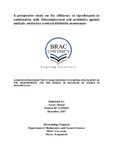A prospective study on the efficiency of ciprofloxacin in combination with chloramphenicol and probiotics against multiple antibiotics resistant Klebsiella pneumoniae
Abstract
Pneumonia is the single largest infectious cause of death in children worldwide. Not only children but also adult from all age groups can be suffered from pneumonia. Pneumonia is a form of acute respiratory infection that affects the lungs. One of the prime pathogens of this infection is Klebsiella pneumoniae. Apparently, it seems pretty uncomplicated to treat K. pneumoniae, however, it is more than challenging to combat because of antimicrobial resistance.
The purpose of the study was to develop new approach to treat antibiotic resistant K. pneumoniae infection. This study aimed in quest of a drug to combine with ciprofloxacin, a broad spectrum antibiotic frequently used to treat lung infections. A total of 23 lung infection bacterial samples were collected and studied against 14 antibiotics of different classes. After primary screening of antibiotic susceptibility, they were categorized into multidrug resistant (MDR), extensively drug resistant (XDR) and pan drug resistant (PDR) pathogens where 9 isolates were MDR, 5 were XDR and 3 isolates were PDR. Furthermore, they were trialed in combination ciprofloxacin along with other 7 drugs in disk diffusion to explore synergistic effect. The combination of ciprofloxacin and moxifloxacin, ciprofloxacin and chloramphenicol and ciprofloxacin with probiotic was found to be synergic. Then the minimum inhibitory concentration test was done for the two combination Ciprofloxacin + chloramphenicol and ciprofloxacin + probiotic. When the individual MIC result was generated, the MIC of the respective combination was analyzed. Furthermore, the fractional inhibitory concentration (FIC) was calculated and in accordance with the results of FIC index, ciprofloxacin-chloramphenicol combination has shown value 0.4510 which revealed synergistic effect against multi drug resistant Klebsiella pneumoniae.
Although, in vivo animal modelling is needed for further validation, this finding is indisputably a novel and great one to combat highly drug resistant Klebsiella pneumoniae in upcoming future.

